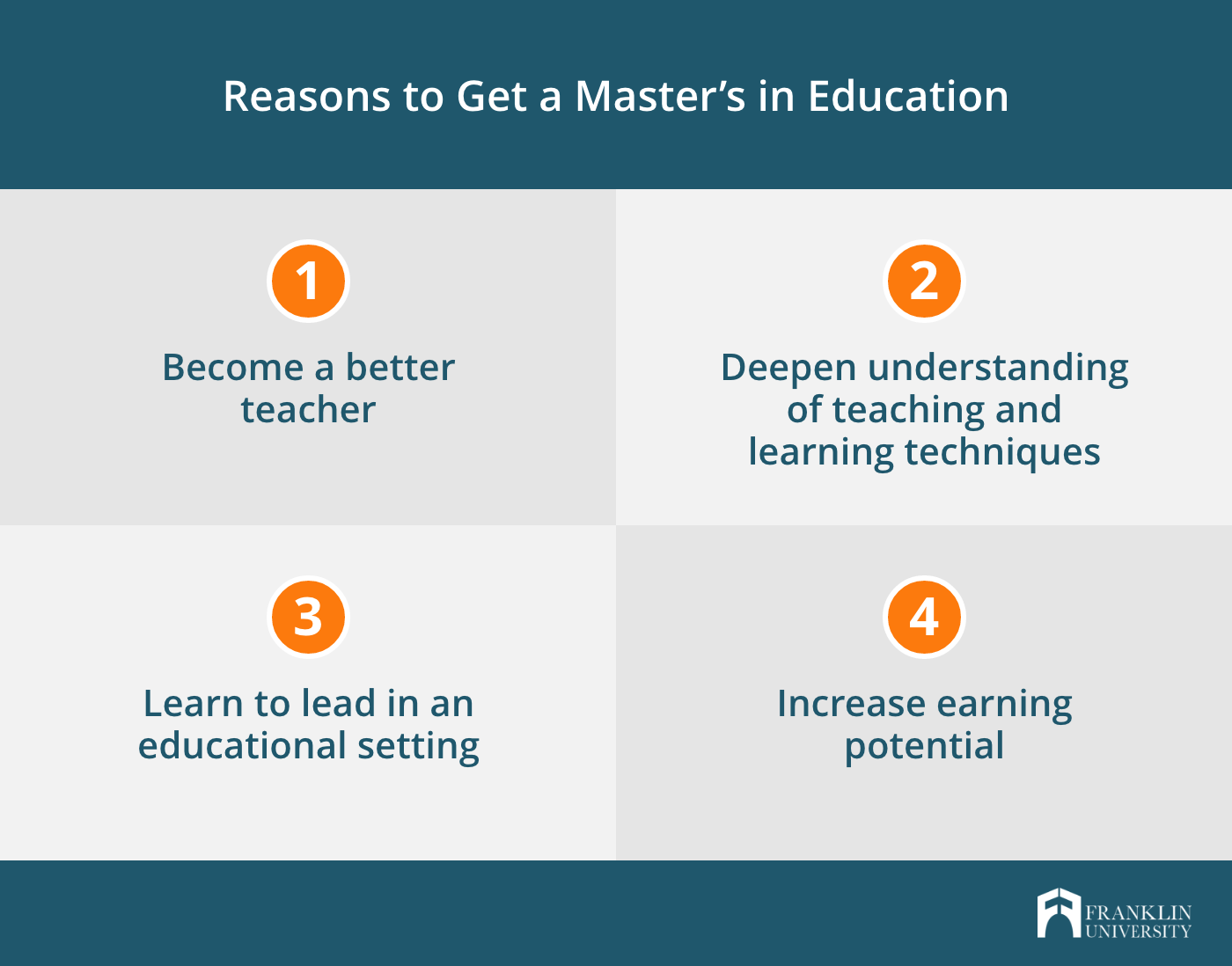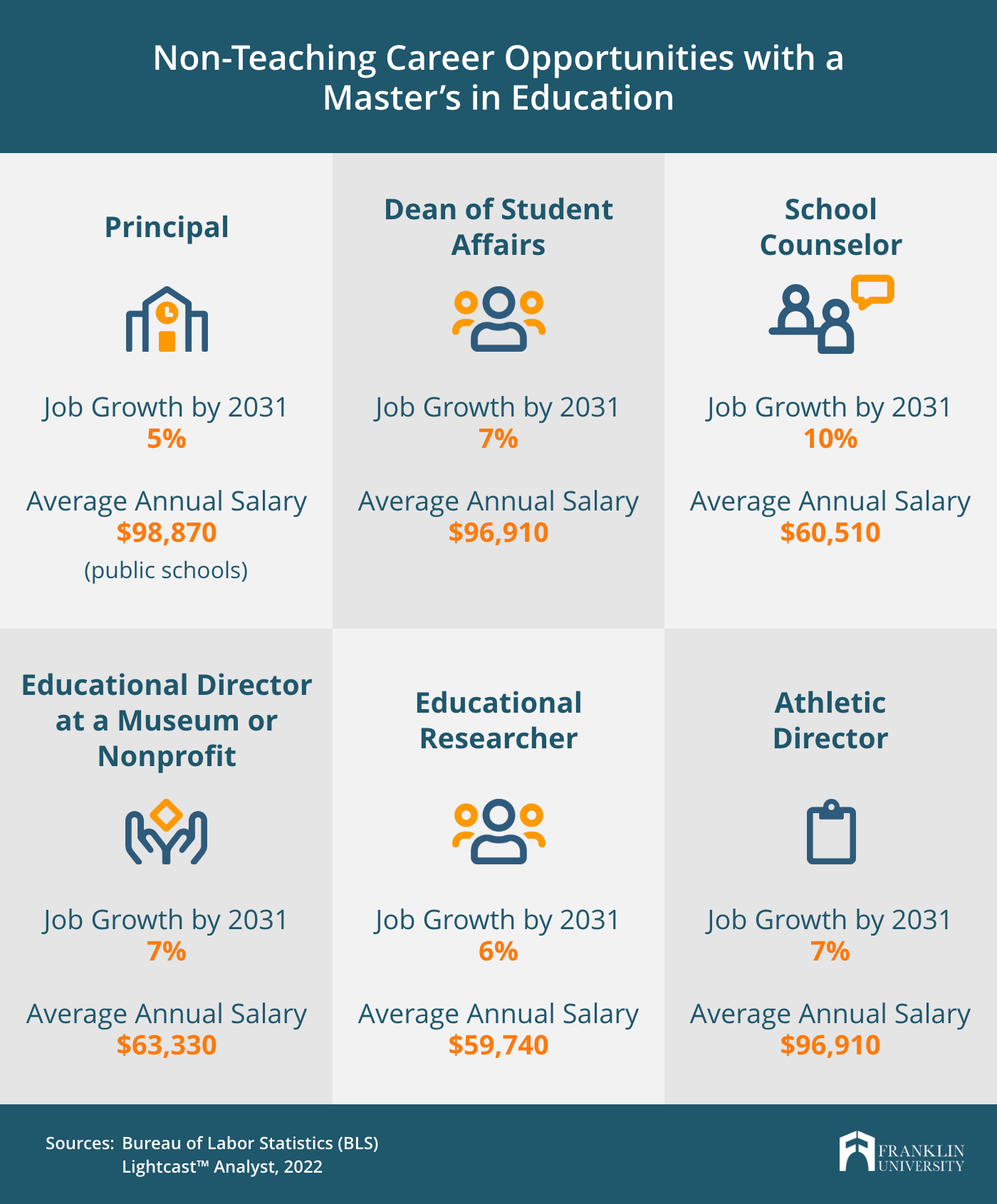Request Information
We're Sorry
There was an unexpected error with the form (your web browser was unable to retrieve some required data from our servers). This kind of error may occur if you have temporarily lost your internet connection. If you're able to verify that your internet connection is stable and the error persists, the Franklin University Help Desk is available to assist you at helpdesk@franklin.edu, 614.947.6682 (local), or 1.866.435.7006 (toll free).
Just a moment while we process your submission.

What Can I Do with a Master’s in Education Besides Teach?
Education and teaching are not synonymous, and there’s a lot that can be done with an education degree in addition to teaching. A degree in education can open doors to a variety of positions across schools, nonprofit organizations and even museums, and a master’s degree in education can open doors to leadership positions in those entities.
According to Patrick Bennett, vice president of Academic Quality and Planning and dean of the School of Education at Franklin University, a master’s in education can be beneficial for people working in a variety of settings.
“The degree is best for becoming more familiar with education leadership, leadership broadly, education law, classroom management, leading others,” he said. “There’s a lot that you can do and it’s transferable to lots of different applications. Whether you’re working in K-12, higher education, or nonprofit or for-profit learning, this degree will be able to assist you”.
A master’s in education is broad and offers specializations that provide expertise in and out of the classroom. A master’s in education program will provide you with the skills, knowledge, and often the field experience necessary to be competitive for careers in a variety of industries.
What’s a Master’s in Education?
A master's in education is a two-year graduate degree program that reinforces the understanding of educational theories, concepts, curriculum and instructional techniques. It’s most commonly pursued either by those seeking to become better teachers, or those pursuing leadership positions in K-12 education, colleges, nonprofits or other organizations.
A bachelor's degree is required to qualify for a master’s in education program. Many students who apply already have teaching licensure, though this is not always a program requirement. A master’s in education is a path that can be taken to become a better teacher, but it’s also a path that can be taken to become a better leader outside of the classroom, meaning classroom experience is not a necessity for every program.
What does a Master’s in Education Consist of?
Master’s in education courses will vary depending on which master’s program you choose to pursue. There are four types of master’s in education degrees:
Master of Education (M.Ed.)
An M.Ed. degree contains a mix of theory and practical skills. There are M.Ed. degrees that are helpful for becoming a better teacher, and others, like the Master’s of Education in Educational Leadership, that are helpful for becoming a better leader, or to achieve a leadership position. The coursework for an M.Ed. in Educational Leadership is leadership-centric. Expect a blend of leadership theory and practice, with courses such as principles of leadership, leadership theory, critical issues in education, educational research and program evaluation.
Master of Arts in Education (M.A. Ed.)
An M.A. Ed. degree is focused on the theories of education and can be used for both leadership and teaching positions. This degree is often pursued by those interested in leadership positions involving policy and procedures.
Master of Science in Education (M.S. Ed.)
An M.S. Ed. degree is focused on building a strong educational foundation through building practical skills. It’s pursued most often by those interested in educational leadership positions, but is also a strong degree for teachers seeking a deeper understanding of education. Many M.S. Ed. programs have diverse specialized offerings depending on which career path you’re interested in taking.
Master of Arts in Teaching (M.A.T.)
An M.A.T. degree is a degree to advance your teaching career. If you wish to become an exemplary teacher, this is a good degree for you. This coursework is a mix of curriculum and instruction courses, often with specialization on a subject that you’d like expertise in teaching. Most M.A.T. programs offer field placement training.

A master’s degree in education is an ideal degree for those seeking to:
- Become a better teacher
- Deepen understanding of teaching and learning techniques
- Learn to lead in an educational setting
- Increase earning potential
Master’s in education degrees are ideal for those pursuing leadership positions, like a principal or superintendent, but note that programs often require licensure following program completion unless otherwise indicated by the university.
Get a FREE education career action plan filled with resources and recommendations from those who are already there.

A master’s in education degree opens up a variety of leadership opportunities outside of the classroom. According to the Bureau of Labor Statistics (BLS), the most common educational leadership opportunities are:
Principal
- Job Function
Principals are responsible for shaping and communicating a schoolwide vision that is committed to the highest standards and improving student success. They are responsible for overseeing school operations, communicating with the community, implementing standards and programs, and may take on additional responsibility such as supervising extracurricular activities. - Requirements
A master’s in education and principal licensure are the requirements necessary to become a principal. - Job Growth
The principal occupation is expected to grow 5% by 2031. Most openings are expected to result from retirement and shifting occupations. - Salary
The median wage for principals, regardless of elementary, middle, or high school, is $98,870 for public schools and $79,780 for private schools as reported by the BLS in May 2021. The lowest 10% earn below $61,480 and the highest 10% earn $153,520.
Dean of Student Affairs
- Job Function
A dean of student affairs is a type of postsecondary administrator that is responsible for ensuring student success by creating an engaged culture of learning. This is accomplished by serving as a student advocate to other administrators, organizing social events, meeting with students and developing strategies that promote engagement. - Requirements
A master’s degree is required for postsecondary education administrators. - Job Growth
The postsecondary education administrator occupation is expected to grow 7% by 2031, which is the national average. The bulk of growth will be in admissions, student affairs and registrars. This growth is due to an accepted nationwide increase in student admissions. Deans and provosts have slower growth projection because there’s typically a set amount per school regardless of student body growth. Deans and provosts will still see growth over the next 10 years, however it will be largely the result of retirement and shifting occupations. - Salary
The median annual wage for postsecondary education administrators was $96,910 in May 2021. The lowest 10% earned less than $59,150, and the highest 10% earned more than $190,770.
School Counselor
- Job Function
Counselors work closely with students on individual levels and small groups to prepare for and succeed in their education, ranging through grade school and preparing for college/trade schools. They’re often responsible for developing, implementing and managing school guidance programs. - Requirements
School counselors typically require a master’s degree and a licensure. - Job Growth
Employment of school and career counselors and advisors is projected to grow 10% by 2031, faster than the average for all occupations. - Salary
The median annual wage for school and career counselors and advisors was $60,510 in May 2021.
Educational Director at a Museum or Nonprofit
- Job Function
Educational directors lead curriculum development, community outreach, program evaluation, fiscal activities and general administrative activities out of a traditional school setting. These positions are often in museums and nonprofits, and can also be in fields like for-profit learning and government. - Requirements
A master’s degree is often required for educational directors. - Job Growth
Employment of educational directors is expected to grow 7% by 2031, on average with other occupations, according to Lightcast™. - Salary
The mean annual wage for educational directors for civic and social organizations was $63,330 in 2021.
Educational Researcher
- Job Function
This position studies the effectiveness and efficiency of classroom learning, processes and how to improve teaching techniques to ensure organizations are giving students the best possible experience. Educational research can be local, market research or performed on a national scale. It often involves analyzing trends and then conducting your own study through focus groups, surveys and interviews, then conducting data analysis. Every day is different as an educational researcher, with some days spent alone designing surveys or analyzing data, and others spent in the community conducting interviews or meeting clients. - Requirements
Educational researchers typically require at least a master’s degree. - Job Growth
Employment of educational researchers is projected to grow 6% by 2031. - Salary
The median annual wage for survey researchers was $59,740 in May 2021. The lowest 10% earned less than $26,360, and the highest 10% earned more than $101,180.
Athletic Director
- Job Function
Athletic directors work with academic and administrative leadership to direct and manage all aspects of an athletic program. This includes staff, budget, operations, compliance and community relations. - Requirements
A master’s degree is often required for athletic directors. - Job Growth
The athletic director occupation is expected to grow 7% by 2031, which is the national average. This growth is due to retirement of current athletic directors and an expected nationwide increase in college enrollment counts. - Salary
The median annual wage for athletic directors was $96,910 in May 2021. The lowest 10% earned less than $59,150, and the highest 10% earned more than $190,770.
Choosing Your Master’s in Education Program
When choosing which master’s in education degree to pursue, consider what your future aspirations are, as some degrees such as the M.Ed. in Educational Leadership are more suitable for leadership positions whereas others like the M.A.T. are more suitable for becoming a better teacher. Regardless of the degree you choose, you will learn leadership, teaching techniques and interpersonal communication skills that can be used in any number of fields.
Timing and convenience are also important factors to consider in choosing your program. The average master’s in education program takes 2-3 years to complete, but some universities offer an accelerated timeline such as the M.Ed. in Educational Leadership program at Franklin University. Programs like these are great for working professionals who need convenient education, and Franklin takes this an extra step by also offering a fully remote program.
Once you’ve settled on the type of degree you’re interested in and the timeline, look at coursework to decide which program suits your interests best.





